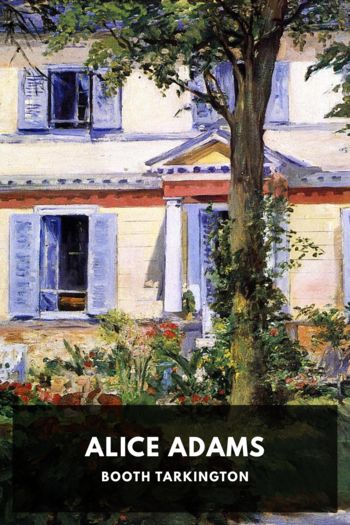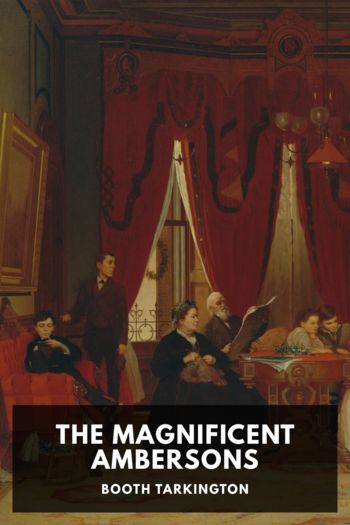Alice Adams by Booth Tarkington (ebook reader macos TXT) 📕

- Author: Booth Tarkington
Book online «Alice Adams by Booth Tarkington (ebook reader macos TXT) 📕». Author Booth Tarkington
“ ‘After all’ isn’t the end of a thought, is it?”
“Sometimes it is of a girl’s thought; I suppose men are neater about their thoughts, and always finish ’em. It isn’t the end of the thought I had then, though.”
“What is the end of it?”
She looked at him impulsively. “Oh, it’s foolish,” she said, and she laughed as laughs one who proposes something probably impossible. “But, wouldn’t it be pleasant if two people could ever just keep themselves to themselves, so far as they two were concerned? I mean, if they could just manage to be friends without people talking about it, or talking to them about it?”
“I suppose that might be rather difficult,” he said, more amused than impressed by her idea.
“I don’t know: it might be done,” she returned, hopefully. “Especially in a town of this size; it’s grown so it’s quite a huge place these days. People can keep themselves to themselves in a big place better, you know. For instance, nobody knows that you and I are taking a walk together today.”
“How absurd, when here we are on exhibition!”
“No; we aren’t.”
“We aren’t?”
“Not a bit of it!” she laughed. “We were the other day, when you walked home with me, but anybody could tell that had just happened by chance, on account of your overtaking me; people can always see things like that. But we’re not on exhibition now. Look where I’ve led you!”
Amused and a little bewildered, he looked up and down the street, which was one of gaunt-faced apartment-houses, old, sooty, frame boardinghouses, small groceries and drugstores, laundries and one-room plumbers’ shops, with the sign of a clairvoyant here and there.
“You see?” she said. “I’ve been leading you without your knowing it. Of course that’s because you’re new to the town, and you give yourself up to the guidance of an old citizen.”
“I’m not so sure, Miss Adams. It might mean that I don’t care where I follow so long as I follow you.”
“Very well,” she said. “I’d like you to keep on following me at least long enough for me to show you that there’s something nicer ahead of us than this dingy street.”
“Is that figurative?” he asked.
“Might be!” she returned, gaily. “There’s a pretty little park at the end, but it’s very proletarian, and nobody you and I know will be more likely to see us there than on this street.”
“What an imagination you have!” he exclaimed. “You turn our proper little walk into a Parisian adventure.”
She looked at him in what seemed to be a momentary grave puzzlement. “Perhaps you feel that a Parisian adventure mightn’t please your—your relatives?”
“Why, no,” he returned. “You seem to think of them oftener than I do.”
This appeared to amuse Alice, or at least to please her, for she laughed. “Then I can afford to quit thinking of them, I suppose. It’s only that I used to be quite a friend of Mildred’s—but there! we needn’t to go into that. I’ve never been a friend of Henrietta Lamb’s, though, and I almost wish she weren’t taking such pains to be a friend of yours.”
“Oh, but she’s not. It’s all on account of—”
“On Mildred’s account,” Alice finished this for him, coolly. “Yes, of course.”
“It’s on account of the two families,” he was at pains to explain, a little awkwardly. “It’s because I’m a relative of the Palmers, and the Palmers and the Lambs seem to be old family friends.”
“Something the Adamses certainly are not,” Alice said. “Not with either of ’em; particularly not with the Lambs!” And here, scarce aware of what impelled her, she returned to her former elaborations and colourings. “You see, the differences between Henrietta and me aren’t entirely personal: I couldn’t go to her house even if I liked her. The Lambs and Adamses don’t get on with each other, and we’ve just about come to the breaking-point as it happens.”
“I hope it’s nothing to bother you.”
“Why? A lot of things bother me.”
“I’m sorry they do,” he said, and seemed simply to mean it.
She nodded gratefully. “That’s nice of you, Mr. Russell. It helps. The break between the Adamses and the Lambs is a pretty bothersome thing. It’s been coming on a long time.” She sighed deeply, and the sigh was half genuine; this half being for her father, but the other half probably belonged to her instinctive rendering of Juliet Capulet, daughter to a warring house. “I hate it all so!” she added.
“Of course you must.”
“I suppose most quarrels between families are on account of business,” she said. “That’s why they’re so sordid. Certainly the Lambs seem a sordid lot to me, though of course I’m biased.” And with that she began to sketch a history of the commercial antagonism that had risen between the Adamses and the Lambs.
The sketching was spontaneous and dramatic. Mathematics had no part in it; nor was there accurate definition of Mr. Adams’s relation to the institution of Lamb and Company. The point was clouded, in fact; though that might easily be set down to the general haziness of young ladies confronted with the mysteries of trade or commerce. Mr. Adams either had been a vague sort of junior member of the firm, it appeared, or else he should have been made some such thing; at all events, he was an old mainstay of the business; and he, as much as any Lamb, had helped to build up the prosperity of the company. But at last, tired of providing so much intelligence and energy for which other people took profit greater than his own, he had decided to leave the company and found a business entirely for himself. The Lambs were going to be enraged when they learned what was afoot.
Such was the impression, a little misted, wrought by Alice’s quick narrative. But there was dolorous fact behind it: Adams had succumbed.
His wife, grave and nervous, rather than





Comments (0)